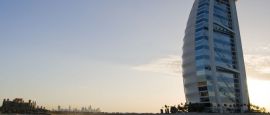United Arab Emirates History, Language and Culture
History of United Arab Emirates
It can be fascinating to examine the UAE’s foray into the modern world when only decades ago, the country was occupied by desert roaming, nomadic Bedouin tribes, who enjoyed simple existences in fishing villages and the peaceful, expansive desert.
The Bedouin people traded with merchants from Iran, China and India before the arrival of Europeans in the 1400s. From the late 1400s, the Portuguese had control over much of the coastal emirates. But in an 1892 treaty, the sheiks that had control over what we now know as the UAE gave up much of their foreign relations power to the British government.
Trading of the UAE’s "black gold" (crude oil) – the source of the country’s infallible wealth - commenced in 1962, after years of hardship that followed the downfall of the pearling industry in the 1930s. It was soon obvious that the British government could no longer administer and protect the emirates, so in March 1971 the treaties ended and the nine Persian Gulf sheikdoms began negotiations to form a union of Arab emirates. On 2 December 1971, Abu Dhabi and Dubai joined forces with four other emirates to form the United Arab Emirates. Sheikh Zayed bin Sultan Al Nahyan, the former ruler of Abu Dhabi, became the UAE’s first president. After he passed away in 2004, his eldest son, Sheikh Khalifa bin Zayed Al Nahyan, took over and he has been president ever since.
● The Dubai police force use Lamborghinis and Ferraris so that they can catch speeders.
● Dubai has no address system and no postal codes. For a package to arrive at the desired location, the sender would have to leave instructions about the destination of the package, or send it to a PO Box.
● The world’s fastest roller coaster is housed at Ferrari World, Abu Dhabi’s indoor theme park.
United Arab Emirates Culture
The vast majority of Emirati nationals are muslims, approximately 90% Sunni and 10% Shia. The UAE follows a policy of tolerating existence of other religions, through the Ministry of Tolerance. Based on the latest Ministry of Economy census in 2005, 76% of the total population is Muslim, 9% Christian, and 15% are recorded as other (mainly Hindu).
Language in United Arab Emirates
Arabic is the official language. English is widely spoken and used as a second language in commerce.
Hi = Salam سلام
Thanks = Shokran شكرا
Welcome = Marhaba مرحبا
How are you? = Kaifa haloka/ haloki (women) كيف حالك؟
Good morning = sabah ala-kheir صباح الخير
Good afternoon = masa' al-kheir مساء الخير.
I'm lost = Ada'tu tareeqi أضعت طريقي! أضعت طريقي!
How much is this = Kam howa thamanoh? كم هو ثمنه؟
Excuse me = Men fathlek/ fathleki (female) فضلك
Sorry = Aasef! !أسف
No Problem = La moshkelah مشكلة




 You know where
You know where